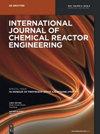Determining and modeling of density and viscosity of biodiesel-diesel and biodiesel-diesel-butanol blends
IF 1.6
4区 工程技术
Q3 Chemical Engineering
International Journal of Chemical Reactor Engineering
Pub Date : 2023-07-20
DOI:10.2139/ssrn.4141428
引用次数: 0
Abstract
Abstract In the present work jatropha, palm, and karanja-based biodiesel and diesel blends, as well as biodiesel diesel and butanol blends, were studied. 112 density data for biodiesel-diesel blends in the temperature range of 30–65 °C were generated. 651 data for viscosity for these blends were generated in the temperature range of 25–65 °C. Blends with butanol were studied only at room temperature. The addition of butanol has not made much of a difference in the density or viscosity of the blends. Empirical models available in the literature were fitted to the data. The linear model in volume fraction and temperature was accurate for density. A generalized model was proposed representing the density for the biodiesel/diesel blend comprising all three biodiesels. A new empirical model for viscosity was also proposed in the study. The proposed model performed well compared to other models, with % an OARD of 3.74 %. A generalized model for viscosity was also proposed. The generalized models could estimate the density and viscosity with % OARD of 0.673 and 5.25 %, respectively.生物柴油-柴油和生物柴油-丁醇混合物密度和粘度的测定与建模
摘要在本工作中,研究了麻疯树、棕榈和卡兰贾基生物柴油和柴油混合物,以及生物柴油-柴油和丁醇混合物。112温度范围为30–65的生物柴油-柴油混合物的密度数据 °C。651这些混合物的粘度数据是在25–65的温度范围内生成的 °C。与丁醇的共混物仅在室温下进行研究。丁醇的加入对共混物的密度或粘度没有太大的影响。文献中可用的经验模型与数据进行了拟合。体积分数和温度的线性模型对于密度是准确的。提出了一个广义模型,表示包括所有三种生物柴油的生物柴油/柴油混合物的密度。研究中还提出了一个新的粘度经验模型。与其他模型相比,所提出的模型表现良好,OARD为3.74 %. 还提出了粘度的广义模型。广义模型可以估计密度和粘度,%OARD为0.673 和5.25 %, 分别地
本文章由计算机程序翻译,如有差异,请以英文原文为准。
求助全文
约1分钟内获得全文
求助全文
来源期刊
CiteScore
2.80
自引率
12.50%
发文量
107
审稿时长
3 months
期刊介绍:
The International Journal of Chemical Reactor Engineering covers the broad fields of theoretical and applied reactor engineering. The IJCRE covers topics drawn from the substantial areas of overlap between catalysis, reaction and reactor engineering. The journal is presently edited by Hugo de Lasa and Charles Xu, counting with an impressive list of Editorial Board leading specialists in chemical reactor engineering. Authors include notable international professors and R&D industry leaders.

 求助内容:
求助内容: 应助结果提醒方式:
应助结果提醒方式:


